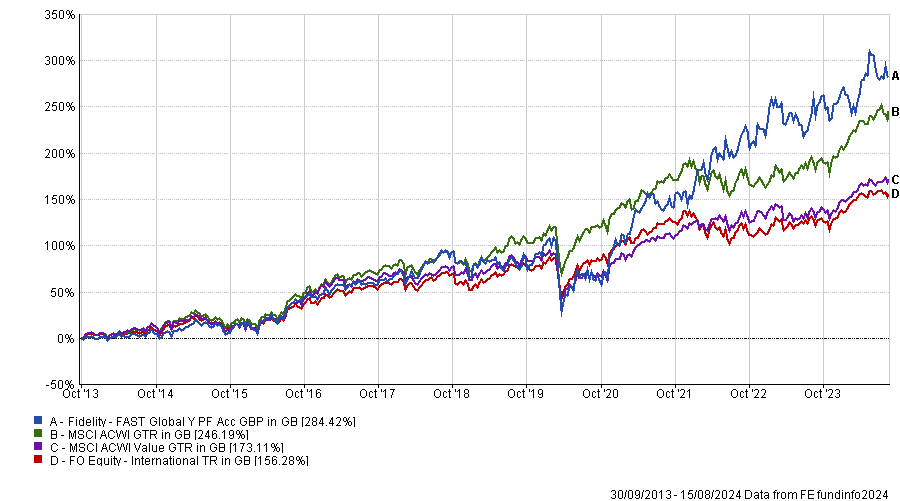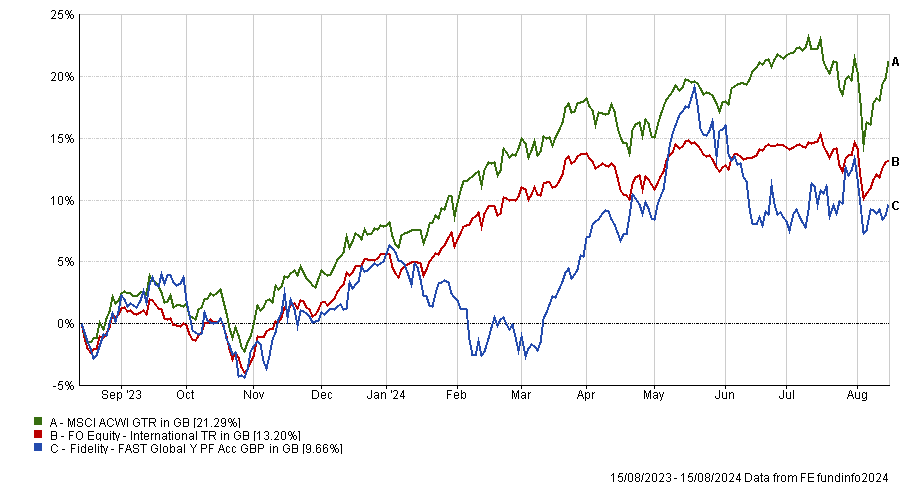Being a fund manager is hard, particularly for those in the global sector, where beating the MSCI ACWI has proven to be an almost insurmountable challenge.
In the FO Equity International sector, where Dmitry Solomakhin’s £1bn Fidelity FAST Global fund sits, just 13% of the peer group has managed to beat the benchmark index over the past decade.
Yet his fund has been one of the rare exceptions, up 270.5% over 10 years, around 60 percentage points ahead of the index. The figure is even more pronounced since the fund’s launch in 2013, as the below chart shows.
Performance of fund vs sector and indices since launch

Source: FE Analytics
This performance is even more impressive when considering his contrarian investment style, which is has been out of favour for most of the period. To show this, we included the MSCI ACWI Value index in the chart above, which has lagged the broader benchmark by some 73 percentage points.
Despite this, he admits that investors who believe the market is right should avoid his fund and stick with an exchange-traded fund (ETF).
Below, he also tells Trustnet why new fund managers are “doomed from a statistical perspective”, how high risk-adjusted returns with low volatility is “science fiction” and why he learned and would change absolutely nothing from his best and worst years.
What is your process?
This is a long/short fund. The long book is a book of blow-ups. What I look for is businesses where the market thinks the model is broken, whether that be operational issues, financial issues or corporate governance issues. They trade at very stressed levels.
Most of the time the market is right. In 19 out of 20 cases if the market says the company is broken, then it is broken. I am trying to find the cases where I think the franchise is good and if the turnaround works it becomes a normal business again.
The short book is currently skewed towards bubble names.
Why should investors pick your fund?
If you look at my peer group, the market has beaten around 87% of the group. So basically if you are a global fund manager just starting in the job you are doomed from a statistical point of view.
So my advice to investors would be not to go for my fund necessarily, but you should go for an outlier. It could be growth, quality or contrarian. Something that gives you a chance of not being in the 87% [of underperformers].
How risky is your fund versus peers?
The long book will be quite volatile and risky just by the nature of the positions that I take. If you think about it, I don’t own anything that goes up when the benchmark does. If it goes up at the same time as the benchmark it is not contrarian – it is a good quality company.
The short book is used solely for alpha generation. It is not used to reduce risk, hedge or pair trades. Every position is a stock-specific view. You can argue that leverage increases the risk over the short term.
The reason I do this is because if you do things the normal way you get normal results. You can be low volatility but you won’t beat the benchmark.
Everyone says you want to have high risk-adjusted returns with low volatility but that is science fiction. It sounds good to clients but does not exist in real life, unfortunately. You have to sacrifice something somewhere.
What have been your best and worst calls in the past year?
Rolls Royce has been in the portfolio for many years. It used to be a value trap. Now it is recovering partly because travel is recovering and partly because management has done an amazing job turning around the company. The contribution to the portfolio has probably been around 627 basis points.
The biggest loser is a short position that I can’t name for compliance reasons but it is one of the artificial intelligence winners. It cost me approximately 475 basis points.
The fund has been in the top quartile of the sector over 10 years. How have you done this?
From the style point of view I suffered when there was a momentum bias because momentum has been working in the market. If you look at those disruptors leading the market, not owning them has cost me a lot of money. Since inception, the fact I am anti-momentum has detracted in relative performance.
What worked on the other side is the idiosyncratic, stock-specific turnarounds that compensated for this headwind.
Were there any particularly good or tough times?
If you look back, 2020 was the worst year ever for the fund. I owned a lot of Covid losers and was short a lot of Covid winners – I just didn’t know it until Covid hit.
The other side of the spectrum was 2022, when momentum factors were a problem. Our headline numbers [returns] went up a lot.
People ask me ‘what went wrong in 2020 and what worked in 2022?’ My response is I learned absolutely nothing and would change absolutely nothing. I owned the same names. What didn’t work in 2020 was exactly the same as what worked in 2022.
Performance has waned over one year – why?
Part of it is shorting the AI winners. Another part is the benchmark has been very concentrated and the Magnificent Seven has been very strong, which is a very significant headwind.
If you believe in the bull market then you don’t need me, buy a Nasdaq ETF and you will save a lot of money. But if you think the market is volatile then you want to have this fund.
The only other thing is, if you buy my fund, don’t make it your main allocation. Because I don’t want people to lose sleep at night or get upset.
Performance of fund vs sector and benchmark over 1yr

Source: FE Analytics
Why do you have so much in the UK?
I started building the position ages ago, it was the day after the Brexit referendum because the currency and market sold off. All of the names are stock-specific special situations and most are global businesses such as Rolls Royce and defence contractor Babcock.
When do you sell?
I start thinking about selling when I am no longer differentiated from the market. If you look at my track record I am almost always too early. Sometimes I am years too early.
There are examples where I missed out on a few hundred percentage points of upside because the stock stopped being contrarian and became quality.
What outside of fund management?
I have three kids. I love the outdoors and, in particular, trail running and mountain running. I used to do a lot of ultra [marathon] races but I’m older now so I do it mostly for fun. It is good psychologically because it clears your head out.





